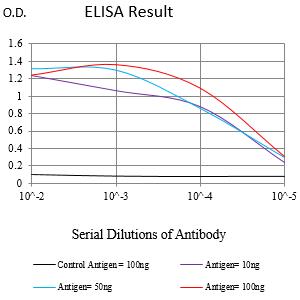
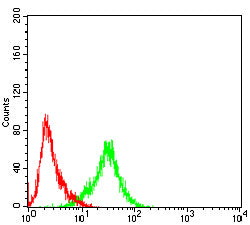
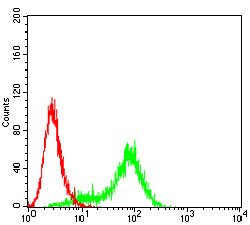
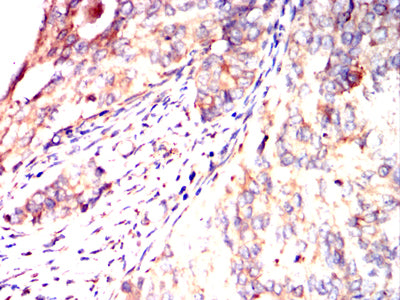
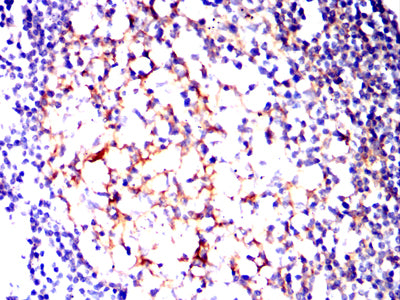
| WB | 咨询技术 | Human,Mouse,Rat |
| IF | 咨询技术 | Human,Mouse,Rat |
| IHC | 1/200 - 1/1000 | Human,Mouse,Rat |
| ICC | 技术咨询 | Human,Mouse,Rat |
| FCM | 1/200 - 1/400 | Human,Mouse,Rat |
| Elisa | 1/10000 | Human,Mouse,Rat |
| Aliases | R2; 4F9; C33; IA4; ST6; GR15; KAI1; SAR2; TSPAN27 |
| Entrez GeneID | 3732 |
| clone | 7G8G4 |
| WB Predicted band size | 29.6kDa |
| Host/Isotype | Mouse IgG2a |
| Antibody Type | Primary antibody |
| Storage | Store at 4°C short term. Aliquot and store at -20°C long term. Avoid freeze/thaw cycles. |
| Species Reactivity | Human, Mouse |
| Immunogen | Purified recombinant fragment of human CD82 (AA: extra 111-228) expressed in E. Coli. |
| Formulation | Purified antibody in PBS with 0.05% sodium azide |
+ +
以下是3篇关于CD82抗体的参考文献及其摘要概括:
---
1. **文献名称**: *CD82/KAI1 inhibits invasion and metastasis of esophageal squamous cell carcinoma via TGF-β/Smad pathway*
**作者**: Li Y, et al.
**摘要**: 该研究利用CD82抗体检测食管鳞癌细胞中CD82蛋白表达,发现其通过抑制TGF-β/Smad信号通路降低肿瘤侵袭和转移能力,提示CD82作为预后标志物的潜力。
---
2. **文献名称**: *CD82 tetraspanin regulates ligand-induced EGFR trafficking and signaling in prostate cancer cells*
**作者**: Odintsova E, et al.
**摘要**: 研究通过CD82抗体阻断实验,揭示CD82通过调控表皮生长因子受体(EGFR)的内吞和再循环,影响前列腺癌细胞增殖及迁移,为靶向治疗提供新思路。
---
3. **文献名称**: *Loss of CD82 expression in colorectal carcinoma: association with clinicopathological features and epithelial-mesenchymal transition markers*
**作者**: Park CS, et al.
**摘要**: 利用免疫组化(CD82抗体)分析结直肠癌组织,发现CD82低表达与肿瘤分期、转移及EMT标志物(如E-cadherin丢失)显著相关,提示其作为转移抑制因子的作用。
---
如需更多文献,可进一步限定研究领域(如特定疾病或机制)进行检索。
CD82 antibody targets the CD82 protein, a member of the tetraspanin family, which plays a critical role in regulating cell signaling, adhesion, and motility. Initially identified as a tumor suppressor, CD82 (also known as KAI1) is implicated in inhibiting cancer metastasis by modulating integrin-dependent pathways and suppressing epithelial-mesenchymal transition (EMT). Its reduced expression correlates with poor prognosis in various cancers, including prostate, breast, and lung cancers. CD82 also interacts with other tetraspanins and membrane proteins to form dynamic "tetraspanin-enriched microdomains," influencing immune responses, viral infection (e.g., HIV-1 entry), and cell fusion processes.
Antibodies against CD82 are widely used in research to study its expression patterns, functional mechanisms, and interactions in both normal and pathological contexts. They enable detection via techniques like flow cytometry, immunohistochemistry, and Western blotting. Therapeutic exploration of CD82 antibodies focuses on restoring its expression or activity to impede metastatic progression. However, challenges remain in understanding context-dependent roles, as CD82 may exhibit dual functions in different cancers or stages. Ongoing studies aim to clarify its regulatory networks and potential as a diagnostic biomarker or therapeutic target in oncology and infectious diseases.
×